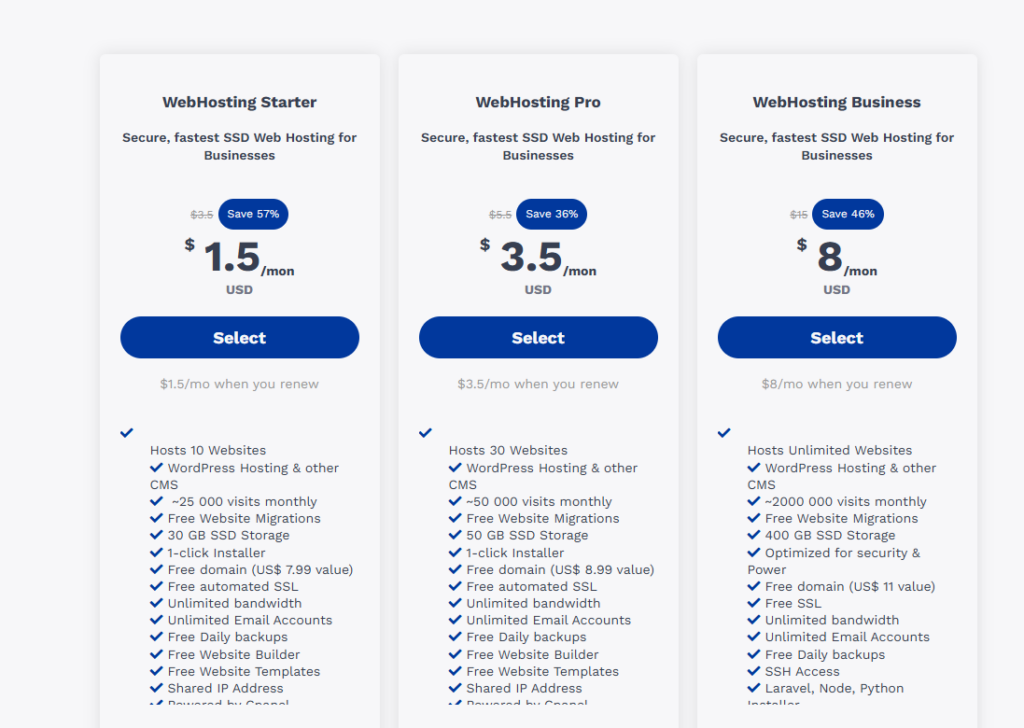As an author, your website serves as your online home. It’s where you can promote your work, interact with readers, and establish your brand. However, much like a physical home, your website requires a strong foundation to grow. That basis is the author website hosting.
Choosing the appropriate hosting company might mean the difference between online success and failure. A poor host selection might result in slow loading times, frequent outages, and even security concerns. These issues can turn off readers, harm your reputation, and eventually reduce your book sales.
So, how do you escape a disastrous situation? This article will provide you with all of the information you need.
The Importance of Author Website Hosting
* Reader Experience:
Slow page load times and frequent site crashes annoy and drive away readers.
* Search Engine Rankings:
Search engines prefer websites that load quickly and are always accessible. Slow loading times might affect your search engine rankings, making it more difficult for readers to find you.
* Professionalism:
Having a reliable website displays the author’s professionalism.
Frequent outages might jeopardize your credibility and reputation.
* Security:
A dependable hosting company protects your website and data from cyber risks like hacking and data leaks.
Types of Author Website Hosting:
1. Shared Hosting:
Shared hosting is a popular choice for new authors who are just starting their online journey and expect low to moderate website traffic. In this hosting approach, numerous websites share the same server and resources (such as CPU, memory, and bandwidth). This makes shared hosting the most affordable choice accessible.
However, because your website shares server resources, it may experience slower performance at times, particularly if other websites on the server have heavy traffic or resource demands. Furthermore, this type of hosting gives you less control over server settings and is more sensitive to security breaches than other hosting options. Despite these limitations, shared hosting is great for beginning authors looking for a cost-effective, low-maintenance hosting solution.
2. VPS (Virtual Private Server) Hosting:
VPS hosting provides more privacy, power, and control than shared hosting. While your website is still hosted on a shared server, VPS allows you a certain percentage of the server’s resources.
Dedicated resources like CPU, RAM, and bandwidth will be available to you, which can help improve your website’s speed and stability. VPS hosting allows for greater customization, as you have more control over server settings, and it generally offers better security compared to shared hosting.
While it’s more expensive than shared hosting, it is a good option for authors who have a growing online presence and want to ensure better performance, security, and control over their hosting environment.
3. Cloud Hosting:
Cloud hosting is a modern, scalable hosting solution that provides high dependability and speed. Instead of hosting your website on a single server, cloud hosting uses a network of interconnected servers, distributing your website’s data and resources over numerous servers.
This configuration helps ensure high availability, redundancy, and the ability to handle traffic spikes, making it ideal for authors who expect moderate to high traffic or those with resource-intensive websites (e.g., large media files, e-commerce stores, or complex blogs). Cloud hosting is also highly flexible—if your website needs more resources, you can easily scale up by adding additional server power.
4. Dedicated Server Hosting:
This hosting provides superior performance and control. With this option, you receive a full server dedicated to your website, which means you don’t share resources with other websites.
This results in increased speed, security, and dependability, making it suitable for authors with high-traffic websites or those with specific technological requirements. Dedicated servers provide complete customization, allowing you to design the server exactly how you want.
Dedicated hosting provides unparalleled performance and control for writers who have a well-established online presence or who manage sizable, resource-intensive websites.
Choosing the Right Hosting Provider for Your Author Website
Selecting the right hosting provider is crucial for the success of your author’s website.
With so many hosting companies available, it’s important to consider factors like scalability, security, support, and performance. To help you make an informed choice, below are a few well-known hosting companies.
i). Truehost

Known for its low-cost plans, TrueHost provides shared and VPS hosting with strong performance and security features.
TrueHost is an excellent solution for authors seeking a low-cost, dependable hosting company.
So if you are looking for a web host for your author website, check Truehost out.
ii). SiteGround
This is a popular choice for WordPress hosting since it provides fast and secure hosting as well as excellent customer service. It’s ideal for authors who want a site that runs smoothly and quickly, thanks to excellent caching and high performance.
iii). WP Engine:
A premium managed WordPress hosting service, WP Engine is designed specifically for WordPress websites. With its high performance, top-tier security, and outstanding customer support, WP Engine is ideal for authors looking for hassle-free, high-quality hosting.
HostGator is a popular alternative for low-cost hosting, offering shared, VPS, and dedicated plans with good scalability options. Whether you run a small blog or a large website, HostGator provides versatile plans that can scale with your needs.
iv). Bluehost
Bluehost is renowned for its exceptional customer service and affordable costs. It also provides one-click WordPress installation and good security measures. It’s a good alternative for new authors, as it’s simple to set up and provides consistent uptime.
Key Features of Good Author Website Hosting:
When it comes to hosting your author’s website, there are various variables to consider. Here is what you should consider:
1. Uptime and Reliability
You want your website to be accessible at all hours of the day. Uptime is the proportion of time your website is online and working properly. You don’t want your website to crash during a book launch or promotional event. A good hosting company will offer at least 99.9% uptime to ensure that your website is always available when visitors visit it.
2. Speed and Performance.
A sluggish website can annoy visitors and increase bounce rates. According to research, even a few seconds of page load time might cause users to abandon a website. Fast website speed is essential for keeping your audience engaged. Choose a hosting service that uses solid-state drives (SSDs), which are faster than traditional hard drives and can greatly boost website speed.
3. Security
Your website’s security is crucial, especially if you handle sensitive information like client information or payment information. Here are the basic security requirements that every author’s website must meet in order to work effectively.
a. SSL Certificate:
An SSL (Secure Socket Layer) certificate is your first line of defense. It encrypts data sent between your website and its visitors, keeping personal information hidden from prying eyes. Beyond security, having an SSL certificate improves your search engine rankings by signaling to both visitors and search engines that your site is trustworthy.
b. Regular Backups:
Imagine spending many hours building your website just to lose everything due to a hacking incident or server crash. Backups should be made regularly to protect your data. Choose automated backup systems that keep your data in many locations, allowing you to quickly and easily recover your website if something goes wrong.
c. Strong Password Policy:
Weak passwords provide an open invitation for attackers. It is critical to have a strong password policy in place for both your website and any associated accounts. Encourage the use of complicated passwords that include letters, numbers, and symbols, and consider enabling two-factor authentication for added security.
d. Security Plugins:
When it comes to systems such as WordPress, security plugins might be your best friend. Using applications like Wordfence or Sucuri, which provide malware detection, firewall security, and real-time threat detection, can help protect your website from such attacks.
e. Frequent software updates:
Hackers may take advantage of flaws in out-of-date software. By updating the CMS, themes, and plugins, you may acquire the latest features and security patches for your website. Plan frequent upgrades and monitor the release of new items from your vendors.
f. Alerts and Monitoring:
Proactive monitoring allows you to be aware of suspicious activity before it becomes out of control. Install technologies that track site changes, login attempts, and other data. By establishing alerts for unusual activities, you may reduce risks and respond promptly.
g. Compliance with Privacy Policies:
Even if you merely collect email addresses for newsletters, you must adhere to privacy regulations such as the GDPR. To create trust and transparency, ensure that your website has a clear privacy policy that informs customers about how their information will be used and protected.
4. Customer Support
No matter how trustworthy your hosting provider is, problems could still arise. Customer service that is friendly and responsive is so essential. A hosting company that provides round-the-clock support via many channels (email, phone, or live chat) can quickly resolve issues, minimizing downtime and maintaining the functionality of your website.
5. Scalability
As your author brand expands, the requirements for your website may vary. Look for a hosting company that provides scalable solutions. Whether you’re adding new pages, hosting an increasing number of visitors, or opening an online store to sell your books, a scalable hosting package can handle your expansion without requiring a whole site redesign.
6. Easy-to-Use Tools
As an author, you most likely would rather write and interact with readers than handle complex technical details. Choose a hosting company that offers easy-to-use features like drag-and-drop website builders, one-click WordPress installation, and basic content management systems (CMS) to make website administration simpler.
Tips for Selecting the Right Web Host:
▪️Check reviews:
Look for unbiased reviews and comparisons of hosting providers to get an informed perspective.
▪️Evaluate features and pricing:
Don’t settle for the lowest price. Compare the features offered and choose a plan that aligns with your needs.
▪️Test customer support:
Reach out to support to assess their responsiveness and helpfulness before committing.
▪️Plan for future growth:
Consider your website’s long-term needs and select a host that can accommodate your growth over time.

Conclusion
Building your identity, interacting with readers, and exhibiting your work as an author all depend on your website. Choosing the right hosting provider is crucial to ensuring that your website is responsive, reliable, secure, and always accessible to users. With the right author website hosting, you can focus on what you do best—writing—by leaving the technical concerns to the experts. Don’t let a poor hosting choice cause your website to crash and burn. Invest in top-notch hosting and watch as your online visibility increases!

